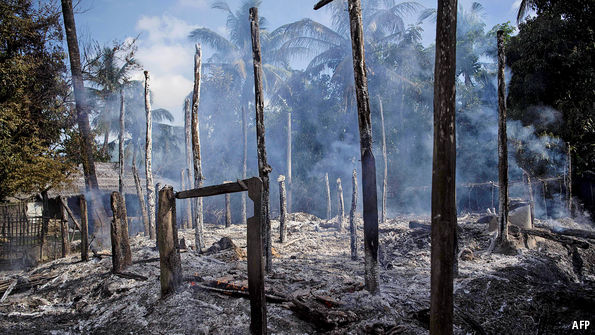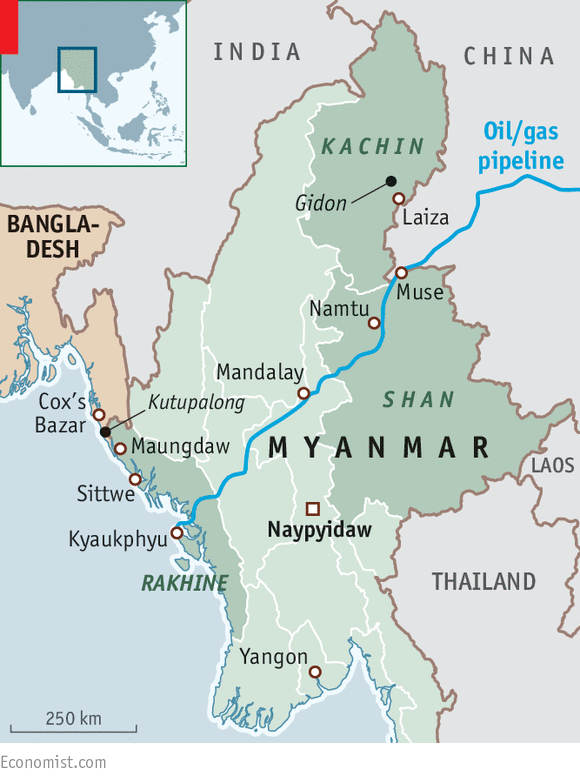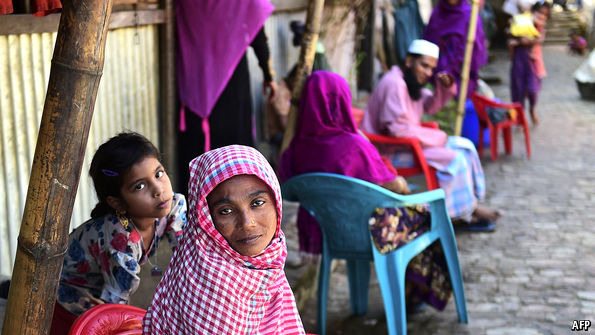A peace prize, but no peaceAung San Suu Kyi fails to calm Myanmar’s ethnic violence
Ending it will need far more courage

Syed’s fears were justified. Myanmar’s army has blocked access to much of Maungdaw, keeping away journalists, aid workers and international monitors (troops claim to be searching for stolen guns and ammunition). But reports have emerged of mass arrests, torture, the burning of villages, killings of civilians and the systematic rape of Rohingya women by Burmese soldiers. At least 86 people have been killed. Satellite imagery analysed by Human Rights Watch suggests that soldiers have burned at least 1,500 buildings—including homes, food shops, markets and mosques (one devastated area is pictured). The organisation says this could be a conservative estimate; it includes only buildings not obscured by trees. Amnesty International says the army’s “callous and systematic campaign of violence” may be a crime against humanity. Myanmar’s government denies all such allegations, dismissing many of them as fabrications.
Around 27,000 Rohingyas—members of a Muslim ethnic group native to Rakhine—have recently, like Syed, fled to Bangladesh. But about 1m of them remain. Before the recent turmoil, tens of thousands of Rohingyas in northern Rakhine relied on aid for food, water and health care. The blockade has severed that lifeline.

Such brutality does not reflect well on Aung San Suu Kyi, a winner of the Nobel peace prize who has led Myanmar since her party’s resounding electoral victory in 2015. Neither does ethnic conflict, which has been intensifying on the other side of the country, speak well of her skills as a peacemaker. She entered office saying her priority was to resolve Myanmar’s decades-long civil wars. Recently, however, a long-running insurgency in Shan and Kachin states has spilled into the area’s towns for the first time in years (see map). It involves the Northern Alliance, a group comprising the Kachin Independence Army (KIA), the Arakan Army, the Ta’ang National Liberation Army and the Myanmar National Democratic Alliance Army. The alliance accuses the national army of detaining, torturing and killing locals, despite the government’s pledge to “resolve [problems] through a peace dialogue.”
This is par for Myanmar’s post-independence course: the country has long been racked by civil conflicts fuelled by an army operating without any civilian constraint. But Miss Suu Kyi was supposed to change this grim status quo. The recent violence shows how far she has to go. A solution will require Miss Suu Kyi to rethink the country’s ethnic policies and restrain an army that is still reluctant to accept civilian command. It is far from clear how committed she is to trying.
Hopes were high when Miss Suu Kyi convened four days of peace talks in Naypyidaw, Myanmar’s capital, beginning in late August, with representatives of 17 of the country’s 20 insurgent ethnic groups. The event was described as the “21st Century Panglong Conference”—a reference to one held in 1947 at which Miss Suu Kyi’s late father, General Aung San, a hero of the country’s fight for independence from Britain, agreed to give the minority Shan, Kachin and Chin populations “full autonomy in internal administration”. (Miss Suu Kyi, like nearly 70% of Myanmar’s population, is ethnic Bamar—the group from which the country’s old name, Burma, is derived.)
This year’s gathering achieved nothing so momentous. Miss Suu Kyi made grandiose statements, the army chief made vague promises, the ethnic-army leaders stated their positions and everyone promised to meet again early in 2017. Encouragingly, the ethnic armies reassured the government that they wanted not secession, but more freedom within a federal state. Miss Suu Kyi and the Burmese army also voiced support for federalism. But what that might mean in practice, and what the army is willing to cede, remain unclear. The army has enriched itself by grabbing land and resources in ethnic regions; it shows little sign of wanting to give them back. The military-devised constitution, imposed on the country after a sham referendum in 2008, gives Miss Suu Kyi’s civilian government no real power to compel the army to do so.
No wonder, then, that disenchantment with state-led peace efforts is growing among minorities. Although the KIA attended Miss Suu Kyi’s Panglong gathering, the Burmese army has been pounding it for months, reportedly seizing the Kachins’ mountain outpost of Gidon this month. The Northern Alliance has recently attacked Burmese army and police forces along the Chinese border. At times it has claimed to hold various border towns. The fighting has driven thousands of people to seek refuge in China, which has reportedly beefed up its military presence along the frontier. The alliance may hope that a riled China will put pressure on Myanmar to make concessions to the ethnic groups (the Kokangs are ethnic Chinese). So far, however, China has not risen to the bait.
Those caught up in the conflict feel let down by all sides. Miss Suu Kyi’s party, the National League for Democracy (NLD), “made a big noise but now, where are they? We cannot see them,” says an ethnic-Shan resident of one strife-torn town, Namtu. Sai Philip, a Catholic of Indian descent, says tactics used by ethnic groups to sustain the fight, such as the occupation of villages, forced recruitment and heavy taxation, have alienated many people.

In Rakhine state, the Rohingyas have not even received a rhetorical acknowledgment from Miss Suu Kyi of their plight. She has kept shamefully silent about it, fearful, perhaps, of upsetting ethnic Bamar, who are mainly Buddhists and many of whom look down on the Muslim Rohingyas. They see them as outsiders, culturally linked more to Bangladesh. Even though Rohingyas have been living in Rakhine for well over a millennium, most are denied citizenship. Miss Suu Kyi is sensitive to international criticism of her government’s stance: on December 19th she convened a meeting in Yangon of foreign ministers from the Association of South-East Asian Nations in an attempt to assuage their concerns. She has also appointed two commissions to investigate abuses in Rakhine state. But she avoids using the word “Rohingya”, calling it “controversial”. The minority is not one of Myanmar’s officially recognised ethnic groups.
This matters because some of the rights guaranteed by Myanmar’s constitution, such as to health care and education, are only conferred on citizens. When the government insists that soldiers in Rakhine are acting in accordance with the “rule of law”, it may be telling the truth: the constitution does not protect non-citizens from arbitrary detention, so mass arrests of Rohingyas may not violate the law. Neither, the government would say, does keeping them in camps, where around 120,000 Rohingyas in central Rakhine have been held since communal riots four years ago. Last year thousands of them took to the sea in rickety boats, but that escape route has been disrupted by Thailand’s crackdown on people-smuggling networks.
The country’s ethnic policies are a relic of the colonial era. They accord each of eight “major national ethnic races” a designated statelet. The rest of the 135 officially recognised groups are classified as subcategories of these. Many ethnic Rakhines worry that if Rohingyas are recognised as such a group and granted citizenship, they will start agitating for their own homeland—which would come out of Rakhine state. As U Thein Maung, an NLD member of Rakhine’s parliament, puts it: “I have nothing against any religion or any kind of people. But I will not accept a single inch of my fatherland becoming Rohingya land.” Such fears—and Myanmar’s preference for talking about the rights of ethnic groups rather than of individuals—make the conflict even more intractable, as they do in other border areas.
Yet talk of recognising the Rohingyas is rare. Mr Thein Maung seems moderate compared with some other ethnic Rakhines. A woman who works in a tea-shop on the outskirts of Sittwe, the state’s capital, says that Muslims and Buddhists could never live together because “Muslims do not know what goodness is.” Maung Hla Kyaw, an older man, says that because “Muslims slaughter their chickens by themselves, that means they will not hesitate to kill us fiercely.” U Pinya Tha Myint, the head monk of a monastery in Sittwe, wants foreign powers to “help the Bengali non-citizens to leave for abroad to any Islamic country that wants to take them.”
The danger of inaction
Myanmar’s ethnic crises may demand more political capital than Miss Suu Kyi is willing to spend. But if left unresolved they risk creating huge problems for her country. One is the possible growth of jihadism. So far the Rohingyas have shown little interest in Islamist extremism. But many of them see a bleak, hopeless future in Myanmar. The International Crisis Group, a think-tank, reckons the attacks in October by Rohingya militants were planned by a well-funded insurgent group whose leaders had been trained in guerrilla-war tactics. Defending Rohingyas from persecution could become a tempting new cause for disaffected young Muslims around the world. Miss Suu Kyi fears paying a political price for speaking out, but silence carries costs.
Another danger is that an upsurge of fighting will impede Myanmar’s economic development, not least by rendering large, resource-rich chunks of the country off-limits or unappealing to investors. The ceasefires that the previous government signed with many, but not all, ethnic armies, look hollower by the day—as does Miss Suu Kyi’s ability to achieve peace and tame the army. The fewer good jobs are available to young men, the more tempting it will be for them to take up arms.
Source: The Economist









